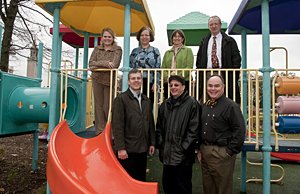
ADVERTISEMENT
- Rozovsky wins prestigious NSF Early Career Award
- UD students meet alumni, experience 'closing bell' at NYSE
- Newark Police seek assistance in identifying suspects in robbery
- Rivlin says bipartisan budget action, stronger budget rules key to reversing debt
- Stink bugs shouldn't pose problem until late summer
- Gao to honor Placido Domingo in Washington performance
- Adopt-A-Highway project keeps Lewes road clean
- WVUD's Radiothon fundraiser runs April 1-10
- W.D. Snodgrass Symposium to honor Pulitzer winner
- New guide helps cancer patients manage symptoms
- UD in the News, March 25, 2011
- For the Record, March 25, 2011
- Public opinion expert discusses world views of U.S. in Global Agenda series
- Congressional delegation, dean laud Center for Community Research and Service program
- Center for Political Communication sets symposium on politics, entertainment
- Students work to raise funds, awareness of domestic violence
- Equestrian team wins regional championship in Western riding
- Markell, Harker stress importance of agriculture to Delaware's economy
- Carol A. Ammon MBA Case Competition winners announced
- Prof presents blood-clotting studies at Gordon Research Conference
- Sexual Assault Awareness Month events, programs announced
- Stay connected with Sea Grant, CEOE e-newsletter
- A message to UD regarding the tragedy in Japan
- More News >>
- March 31-May 14: REP stages Neil Simon's 'The Good Doctor'
- April 2: Newark plans annual 'wine and dine'
- April 5: Expert perspective on U.S. health care
- April 5: Comedian Ace Guillen to visit Scrounge
- April 6, May 4: School of Nursing sponsors research lecture series
- April 6-May 4: Confucius Institute presents Chinese Film Series on Wednesdays
- April 6: IPCC's Pachauri to discuss sustainable development in DENIN Dialogue Series
- April 7: 'WVUDstock' radiothon concert announced
- April 8: English Language Institute presents 'Arts in Translation'
- April 9: Green and Healthy Living Expo planned at The Bob
- April 9: Center for Political Communication to host Onion editor
- April 10: Alumni Easter Egg-stravaganza planned
- April 11: CDS session to focus on visual assistive technologies
- April 12: T.J. Stiles to speak at UDLA annual dinner
- April 15, 16: Annual UD push lawnmower tune-up scheduled
- April 15, 16: Master Players series presents iMusic 4, China Magpie
- April 15, 16: Delaware Symphony, UD chorus to perform Mahler work
- April 18: Former NFL Coach Bill Cowher featured in UD Speaks
- April 21-24: Sesame Street Live brings Elmo and friends to The Bob
- April 30: Save the date for Ag Day 2011 at UD
- April 30: Symposium to consider 'Frontiers at the Chemistry-Biology Interface'
- April 30-May 1: Relay for Life set at Delaware Field House
- May 4: Delaware Membrane Protein Symposium announced
- May 5: Northwestern University's Leon Keer to deliver Kerr lecture
- May 7: Women's volleyball team to host second annual Spring Fling
- Through May 3: SPPA announces speakers for 10th annual lecture series
- Through May 4: Global Agenda sees U.S. through others' eyes; World Bank president to speak
- Through May 4: 'Research on Race, Ethnicity, Culture' topic of series
- Through May 9: Black American Studies announces lecture series
- Through May 11: 'Challenges in Jewish Culture' lecture series announced
- Through May 11: Area Studies research featured in speaker series
- Through June 5: 'Andy Warhol: Behind the Camera' on view in Old College Gallery
- Through July 15: 'Bodyscapes' on view at Mechanical Hall Gallery
- More What's Happening >>
- UD calendar >>
- Middle States evaluation team on campus April 5
- Phipps named HR Liaison of the Quarter
- Senior wins iPad for participating in assessment study
- April 19: Procurement Services schedules information sessions
- UD Bookstore announces spring break hours
- HealthyU Wellness Program encourages employees to 'Step into Spring'
- April 8-29: Faculty roundtable series considers student engagement
- GRE is changing; learn more at April 15 info session
- April 30: UD Evening with Blue Rocks set for employees
- Morris Library to be open 24/7 during final exams
- More Campus FYI >>
10:52 a.m., Nov. 22, 2010----The Delaware Health Sciences Alliance (DHSA) has awarded grants to two collaborative pilot projects, both focusing on children's health.
One group of researchers will develop novel approaches to studying determinants of childhood obesity, and the other will explore the relationships between brain activity and exercise interventions in children with cerebral palsy.
A coalition comprising Christiana Care Health System (CCHS), Nemours/A.I. duPont Hospital for Children (Nemours), Thomas Jefferson University (TJU), and the University of Delaware (UD), DHSA was established in 2009 to improve health and healthcare services in Delaware.
“It's appropriate that the alliance is supporting research on the health of the youngest members of our society,” said Kathleen Matt, executive director of DHSA and dean of the UD College of Health Sciences. “We're also holding a conference on women's and children's health next month because we view this as a critically important area of research and practice.”
Childhood obesity project
Nearly 40 percent of Delaware youth are overweight or obese as the result of a complex interplay of genetic, behavioral, environmental, and health system factors acting over time.
Led by Dr. Deborah Ehrenthal, a clinician and researcher from the Department of Obstetrics and Gynecology and the Christiana Center for Outcomes Research at CCHS, the childhood obesity project will create a longitudinal cohort of mother-baby pairs using clinical data gathered from mothers before and during pregnancy and from their children from birth to age three.
Data of interest include medical diagnoses such as diabetes, pre-pregnancy obesity, pregnancy weight gain, and breast-feeding, as well as baby's gestational age, birth weight and growth pattern.
“There is evidence that the tendency to become obese as an adult develops very early, perhaps before birth,” Ehrenthal says. “An understanding of early predictors of obesity will help guide the development of interventions designed to reduce obesity and to improve the outcomes of those affected.”
Ehrenthal's collaborators on the project are Kristin Maiden (CCHS); Judith Ross (TJU); Samuel Gidding, David West and Louis Bartoshesky (Nemours); and Benjamin Carterette and Michael Peterson (UD).
Cerebral palsy project
Cerebral palsy is the most prevalent neurological diagnosis in children, with about 9,750 new cases each year in the U.S. Individuals with CP have diverse clinical impairments that can lead to decreased independence, physical activity and quality of life.
Led by Stuart Binder-MacLeod, Edward L. Ratledge Professor and chair of the Department of Physical Therapy at UD, the researchers on this team will focus on elucidating the relationships between the neural correlates of CP and functional ability.
They will use a non-invasive, cost-effective, and quick procedure known as transcranial magnetic stimulation (TMS) as an adjunct to neuro-imaging and clinical data to obtain information about brain function in CP, which occurs in approximately one in 500 live births.
The overall goal is to collect pilot data for a future larger-scale research project to understand how different cortical organization patterns following CP are related to motor function and how these relationships change with exercise intervention.
Binder-MacLeod is collaborating with Samuel Lee and Trisha Kesar (UD), Freeman Miller (Nemours), Susan Duff (TJU), and Kert Anzilotti (CCHS) on the project.
Background on DHSA pilot grants
DHSA pilot grants provide up to $75,000 for projects ranging from 12 to 18 months. Projects are selected based on scientific merit, the potential to lead to a larger proposal for NIH funding, and the ability of the research team, which must include at least one investigator from each member institution, to demonstrate successful collaboration among the four institutions.
The four projects funded during the first two rounds of competition focus on cancer, cardiovascular studies, and creation of a bioinformatics framework to facilitate translational research among the alliance members.
The next DHSA call for proposals will be made in February 2011.
For more information on pilot grant funding as well as the conference on women's and children's health, to be held at UD on Thursday, Dec. 9, visit the DHSA website.
Article by Diane Kukich



